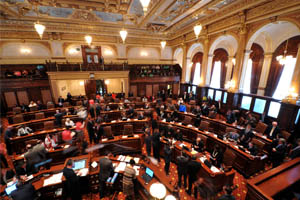- Details
- Category: Latest News
 SPRINGFIELD – A new law that will give more flexibility to medical patients who are benefiting from a certain drug but are required by their insurance companies to take a less-costly medication was signed into law recently by the governor.
SPRINGFIELD – A new law that will give more flexibility to medical patients who are benefiting from a certain drug but are required by their insurance companies to take a less-costly medication was signed into law recently by the governor.
“Patients suffering from chronic conditions, such as cancer, multiple sclerosis or mental illness, rely on effective medical treatments to manage their conditions,” State Senator Julie Morrison (D - Deerfield) said. “When an insurance bureaucrat tells a patient the medication they are currently taking will no longer be covered, it can bring uncertainty and worry to patients already struggling with a serious health concern.”
- Details
- Category: Latest News
 SPRINGFIELD – A new law passed by Senator Julie Morrison (D – Deerfield) earlier this year and signed today by the governor will expand court protections for individuals with intellectual disabilities, cognitive impairments and developmental disabilities.
SPRINGFIELD – A new law passed by Senator Julie Morrison (D – Deerfield) earlier this year and signed today by the governor will expand court protections for individuals with intellectual disabilities, cognitive impairments and developmental disabilities.
“For victims of physical or sexual assault, taking the stand and confronting an accuser is often a very emotional and trying experience,” Morrison said. “For an individual with an intellectual disability, the process can be completely overwhelming.”
Current Illinois law allows an individual with an intellectual disability, who has been the victim of certain crimes involving physical or sexual assault, to designate someone to testify in court on their behalf. Known as a hearsay exception, the law is vague and excludes many vulnerable victims.
- Details
- Category: Latest News
 SPRINGFIELD – A plan passed by State Senator Julie Morrison (D – Deerfield) making it easier for domestic violence victims to file temporary orders of protection was signed into law today by the governor.
SPRINGFIELD – A plan passed by State Senator Julie Morrison (D – Deerfield) making it easier for domestic violence victims to file temporary orders of protection was signed into law today by the governor.
“Victims of domestic violence often face many emotional and psychological challenges that make it difficult to report their abuse and admit abuse by their partner,” Morrison said. “In instances where safety is in jeopardy, we must make temporary orders of protection accessible and available to protect anyone from further abuse.”
Morrison introduced House Bill 6109 earlier this year that would permit the Illinois Supreme Court to establish a pilot program that would allow individuals to electronically file petitions for temporary orders of protection. Currently, a person must appear in a civil court to file a petition for an order of protection.
- Details
- Category: Latest News
 SPRINGFIELD – Tragic events around the country continue to highlight what happens when firearms get in the wrong hands.
SPRINGFIELD – Tragic events around the country continue to highlight what happens when firearms get in the wrong hands.
In an effort to reduce access to firearms by individuals suffering from mental illness, State Senator Julie Morrison (D – Deerfield) introduced a plan earlier this year that was signed today by the governor.
“We are suffering from an epidemic of gun violence in this country,” Morrison said. “Every day, we hear of more death and suffering because individuals who shouldn’t have easy access to guns have no problem obtaining firearms.”
Current Illinois law requires circuit court clerks to relay information to the Illinois State Police when a person passes through the court system and is deemed to have a mental disability or is involuntarily committed to a mental institution. The information is used to ensure FOID cards, which are required to legally own a firearm in Illinois, are not administered.
More Articles …
Page 61 of 97





